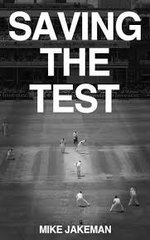Saving the Test
Martin Chandler |Published: 2013
Pages: 206
Author: Jakeman, Mike
Publisher: Ockley Books
Rating: 3.5 stars

If Test cricket is being compromised in any way, then I am dead against it. Everything comes from Test cricket, all the other formats of the game and the reputations that players gain, it all comes from playing – or aspiring to play – Test cricket. We know that, as players, we know how the game works.
For me Jacques Kallis, from whom Mike Jakeman sourced that soundbite, is the archetypal Test match cricketer. His Test record is, whatever misgivings some may have about him, one that demands he be considered in the mix for the title of the finest all-round talent produced in almost 140 years of Test cricket.
As its title implies Saving the Test concerns itself with the question of whether or not, in another 140 years time, Kallis’ records will be like those of Sir Jack Hobbs and Wilfred Rhodes, set in stone for all time due to a sea change in the way in which the game is played.
No one with any feel for the ultimate form of the game can be in any doubt but that there are threats to the primacy of Test cricket, and challenges all formats of the game must respond to. Some changes are irreversible, as Jakeman’s paean for the Australian tour of 1972, when the side led by Ian Chappell played 21 First Class matches as well as five Tests and three ODIs illustrates. But it does highlight one of the very real concerns in the modern game, that being the inability of touring sides to get sufficient match practice for the international fixtures that are shoehorned into a modern tour itinerary.
As well as examining tours Jakeman takes a long hard look at the shorter formats of the game. He considers too the pitches on which Test matches are played, the nature of which are so crucial to the quality of cricket that we see. The issues that modern technology brings with it are a further important factor that is fully explored. Given that money is the root of all evil and, certainly in cricketing terms, of much of what is good as well, there is a study of this potentially darker side of the game, as well as at the broadcasters who, by and large, pay the money that permits the less attractive Test series to remain economic.
Jakeman tackles each of his main subject areas in a single chapter before then going on to a shorter closing chapter summarising his conclusions, the core of which sets out five suggestions he believes are the best means of seeking to safeguard the future of the ultimate form of the game.
Until Saving the Test dropped through my letterbox I had not heard of author Mike Jakeman, and the book itself does not give a great deal away on that one, but he is clearly a cricket lover who cares deeply about the five day game. He is also a writer, although as far as I can discern mainly in relation to Economics and Politics as they relate to Asia and Oceania. I won’t pretend that that background did not give me some misgivings, but those were unnecessary. The book is written in an engaging and well-presented way and does not in any way amount to a policy document or dossier of the sort I feared it might be.
Of course all the arguments on this subject have been well-rehearsed in the media for years and most of what Jakeman writes breaks no new ground, although he marshalls his case well. In terms of the argument as a whole, he manages to bring order out of disorder, and perhaps most importantly made me consider the problem as a whole rather than, as often happens given the haphazard way in which news stories break, in relation to one issue in isolation.
I found myself agreeing with most of the conclusions in Saving the Test, as indeed I would expect most of its readers will. It is not the sort of book that someone with no interest in Test cricket is ever going to pick up, but the real talking point is Jakeman’s view that cricket needs to find its Bob Bowman. I had never heard of Bowman before I opened the book, or the story of how he masterminded the development of a centralised web portal streaming live baseball matches in North America. Jakeman believes the concept that has been so successful there can be readily transferred to cricket. I am not quite convinced, but then Jakeman is an economist and I am not, and he certainly has a point that deserves a full airing, and he may well be right. His book is certainly one that should be widely read.







Leave a comment